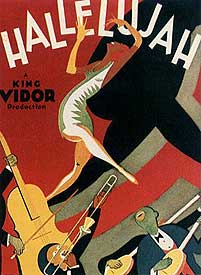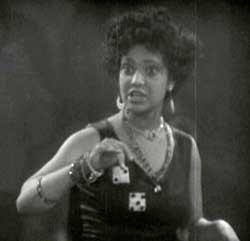 King Vidor meant so well in writing & directing Hallelujah (1929) that it's kind of tragic how demeaningly stereotyped it comes off. Vidor grew up in a part of Texas where he believed he was able to observe how African Americans lived & thought, a delusion at best.
King Vidor meant so well in writing & directing Hallelujah (1929) that it's kind of tragic how demeaningly stereotyped it comes off. Vidor grew up in a part of Texas where he believed he was able to observe how African Americans lived & thought, a delusion at best.
He shot much of the film on locations around Memphis so it wouldn't look sound-stage phony. He sought nationally for the best black performers. He had face-to-face meetings with black thinkers & entertainers for feedback & assistance in making the story & the imagery as realistic as he could, & to avoid being insulting.
But in writing the story personally, he just could not divest either the script or himself of white attitudes toward blacks, & the resultant film could've been subtitled A Cavalcade of Stereotypes.
And it is not just hindsight that reveals flaws deeper than in most black-cast films. Opinion was varied when the film was brand new. Some had praise for the film merely because it was so great & rare to see African Americans in such extravagant leading roles, & some of the performances were undeniably fine ones, especially that of Nina Mae McKinney whose legendary status as a screen love goddess hinged all but entirely on this one film.
But right away black intellectuals were bothered by the animalistic manner by which Zeke (Daniel L. Haynes) had no human control over his sexual urges, to the point that he nearly raped his own adopted sister Rose (Victoria Spivey), who he instead decided to marry, with intimations of incest planned in advance by his mother.
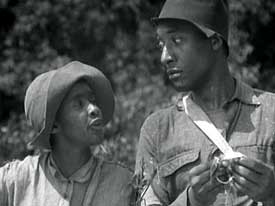 This "animalism" of black folks was furthered by the "humorous" arrival of a "respeckable" man & woman at the Parson's house, eager to get married after already having "elebbin chillen." This "animalism" of black folks was furthered by the "humorous" arrival of a "respeckable" man & woman at the Parson's house, eager to get married after already having "elebbin chillen."
All the suffering & poverty & woe experienced in Black America is shown to be strictly the fault of black weakness & self-degradation & uncontrollable sexual urges, in a separatist universe where whites don't exist & thereby have no effect on black conditions. No larger cultural context of oppression restricts blacks, so if they are impoverished or degraded, they have only their own inferiority to blame.
The film relies on stereotypes from cottonpickers to tapdacing banjo pluckers at family feasts to busting rocks on a chain gang to murderous violence & threatened rape on the part of the "hero" before we even get 'round to any villains.
Later charges from radicals were sometimes unjust, that Daniel L. Haynes & other actors were a bunch of Toms merely to be in the film. But for myself, as someone who hugely enjoys black cast films, this one was often hard to look at, as Vidor's strongly paternalistic guiding hand did not permit much in the way of actors smuggling their own sensibilities into their childlike roles.
Some of what Vidor wished to convey is decent & good -- depth of emotion, family bonds, sense of community. And in some parts, even when reliant on such stereotype as cottonpickers, he develops with a documentarian's depth, showing what really occurred getting cotton to market, making his cottonpickers independent farmers rather than sharecroppers or near slaves, providing a cultural & economic context for the stereotype rather than the stereotype alone.
Black folk did exist in separatist villages of the south with a lot of self-sufficiency farming, including the farming of cotton, & obviously Vidor could've made all sorts of excuses for his writing. Yet those opening images of illiterate cottonpickers singing "Swanee River" happy as children playing in the sun denies that it's a hard way to make a living.
For all the "documentary" realism, you'd never guess how injured fingers get plucking those thorn-sharp burst pods. True realism would not have fit Vidor's purely white Romanticist vision of poor rural blacks, a vision that was very far divorced from authentic black experience.
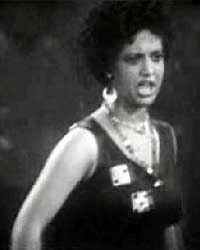 I wouldn't call all the singing stereotypical even if others have, as Hollywood coming out of the silent film era was expecting the important movies would be musicals. And one of the great strengths of black-cast films is the music.
I wouldn't call all the singing stereotypical even if others have, as Hollywood coming out of the silent film era was expecting the important movies would be musicals. And one of the great strengths of black-cast films is the music.
Zeke singing Irving Berlin's "Waiting at the End of the Road" with choral back-up by the Dixie Jubilee Singers is nothing to deplore.
His singing "Swing Low, Sweet Chariot" after causing the death of his own brother is effectively emotional. And the film's climax has Daniel singing William A. Fisher's "Goin' Home, Goin' Home" good enough to almost make the trumped up happy ending acceptable.
And there are additonal Negro spirituals arranged by Henry Thacker Burleigh for the Dixie Jubilee Singers. These include "Sometimes I Feel Like a Motherless Child," "Gimme that Old Time Religion," "Let My People Go" & "Get on Board Little Children."
But the great musical moment of the film is the lengthy sequence symbolic of Harlem club nights though supposedly set in an African American riverside town of gambling & mayhem.
Such "resort" towns did exist but whether they were anything like this one, I doubt, though I don't know. The inspiration for the set appears to be wild west mining-town movies, just replacing the white saloon girls & rowdy cowboys & miners with a black cast of whores, gangsters, & the easy-mark cottonpickers.
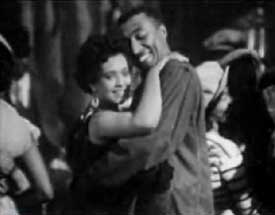 We are just going to have to put aside the annoying cliche of black jazz being the root of all temptation. We are just going to have to put aside the annoying cliche of black jazz being the root of all temptation.
In films about white jazz, even if done in black face as for The Jazz Singer (1927), the music is good, better even than being a sacred cantor.
But it became time-honored to insist that among black folk, their music led to sinfulness & violence & they should stay home & play the banjo under a magnolia tree, if their fingers weren't too badly cut-up by picking the cotton pods that is.
Curtis Mosby & his Dixieland Blues Blowers add ragtime glory to the "sinful club" scene, with dapper drummer "Mose" Mosby juggling his drumsticks over a minimal drum kit, without missing a beat. Besides accompanying Nina Mae McKinney on Irving Berlin's "Swanee Shuffle," he composed much of the incidental music (whatever wasn't spiritual music) for the soundtrack.
After the opening instrumental ragtime, the music stops a moment & out steps Nina Mae in her role as Chick to sing "Swanee Shuffle." She's amazing, kind of a flapper, two dice printed on her dress showing a two & a five.
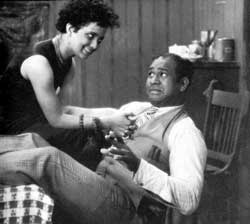 This sequence makes the Roaring Twenties truly look like the best decade for fun, for jazz, for beauty whether or not of a decadent kind. But the smoke in the room is so thick that sometimes Nina Mae almost vanishes into the cloud. This sequence makes the Roaring Twenties truly look like the best decade for fun, for jazz, for beauty whether or not of a decadent kind. But the smoke in the room is so thick that sometimes Nina Mae almost vanishes into the cloud.
When she's done, she goes to the edge of the dance floor to hug & love Zeke, while two very short stout dancers take the floor, cute as all hell & twice as skilled, camping it up with even a couple cake-walk steps. Then a big guy comes out to soft-shoe with artful clumsiness; his oversized shoes identifies him as an authentic chitlin-circuit Vaudevillian of the "baggy pants" tradition who always wore outsized shoes.
The waiters take the floor next & serve as a tap line of chorus boys backing up Nina Mae who has returned center stage to show her great steps. If the series of dance-acts may be regarded as duelists showing their best moves, then the hands-down winner is Nina Mae herself, who is just staggeringly original in her steps.
Mosby's band takes up a slow-dance number next, with bluesy horn dominant. Chick & Zeke are hugging on the dance floor, as Chick converses & cajoles, setting Zeke up to lose the hundred dollars he got for the season's cotton harvest, which represents the hard labor of his entire family.
Essentially the best part of the film is over with now & we return to seeing what an unintelligent childish & violent rube Zeke is, ruled by his pecker.
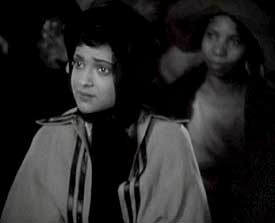 Fool Zeke gets in a fight with Chick's confederate, the crooked gambler Hot Shot (William Fountaine). He draws a knife on Hot Shot, inducing the gambler to draw a gun. Fool Zeke gets in a fight with Chick's confederate, the crooked gambler Hot Shot (William Fountaine). He draws a knife on Hot Shot, inducing the gambler to draw a gun.
Zeke's a big guy & gets the gun away from his enemy, but it goes off, & as the club empties out in a stampede, Zeke is left alone with his accidently shot & dying brother, Spunk (Everett McGarrity).
As heros go, Zeke's been a villain, & deserves a thrashing from here to Sunday. Hot Shot can't be blamed for the shooting as he only drew his gun when Zeke threatened to knife him. The real source of Zeke's profound folly is Zeke & Zeek alone, according to King Vidor's dubious storytelling.
In the aftermath of his sinfulness, Zeke goes into a religious frenzy, & joins his reverend pappy (Harry Gray) to become a star of travelling revival shows.
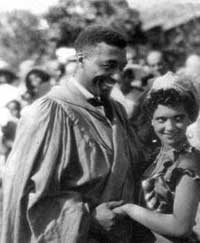 Rustic gospel singing & woeful misery, wailing & preaching, is just more stereotyping where character falls short. And as it has been Zeke's basic character to be a total screw-up, he's pretty much a phony at the religion game too. Rustic gospel singing & woeful misery, wailing & preaching, is just more stereotyping where character falls short. And as it has been Zeke's basic character to be a total screw-up, he's pretty much a phony at the religion game too.
While the revival shows are on the road, Zeke again encounters Hot Shot & Chick. His first act is to assault them; what kind of preacher is that? Then when Chick is moved by his preaching & wants to become a good woman, instead of assisting her salvation he just wants to screw her.
He goes all lust-mode because Vidor never for a moment questions the racist belief that African Americans are rutting animals & neither family responsibility nor faith in God is ever going to be enough to overcome the inescpable inclinations of an alpha male in the pack.
Although Zeke decides to marry his half-sister Rose to overcome his desire for Chick, when Chick shows up to be baptized, he runs off with her at once, having completely sabotaged her salvation & giving her very little in exchange, not to mention his emotional maltreatment of Rose.
We next see him & Chick living as though man & wife in a little milltown, where she's bored to death & he supports them as a wage earner far from any family or friend or any of the emotional support he could expect in his home town.
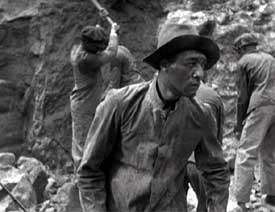 [SPOILER ALERT!] But Hot Shot tracks down Chick & by then, much as she really liked Zeke, she's definitely ready to run off. [SPOILER ALERT!] But Hot Shot tracks down Chick & by then, much as she really liked Zeke, she's definitely ready to run off.
Zeke catches them preparing to leave & takes off after them with a shotgun, murder still being his big inclination. The death of Chick, asking mostly that she be lifted out of the mud she has fallen in, is a great moment for Nina Mae's acting.
Immediately blaming Hot Shot for Chick's death, & never anywhere in the script accepting responsibility to himself, Zeke then stalks Hot Shot through a swamp & murders him.
Vidor's script seems genuinely not to realize Hot Shot though a sinner & a con artist wasn't an all-out villain & by no means deserved this gruesome death, though the script does seem to understand that Chick might've been saved if not for Zeke's out of control sexual urges foiling her religious conversion & finally causing her death.
Justifiably on a chain gang (providing King Vidor with one more stereotyped image of the African American male), his prison term is apparently quite short. This ending is so hasty it seems as though the budget was running out & it was time to wrap things up quickly.
He's only committed two acts of manslaughter & one of outright murder, but since only black folks died, I guess the law only gave him a few months, as soon Zeke is released & singing "Goin' Home" to the embrace of his mammy (Fanny Belle DeKnight) & to his adopted sister who has waited for him for their semi-incestuous happy ending. [END SPOILER ALERT]
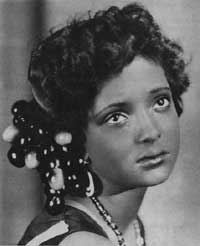 A great many of the black-cast films can be faulted for their stereotypes, including those from independent black directors like Oscar Michaux & others. But I can usually see past the cliches to the great performances, & if vintage black-cast films may be regarded a unique genre, to me it is one of the best genres.
A great many of the black-cast films can be faulted for their stereotypes, including those from independent black directors like Oscar Michaux & others. But I can usually see past the cliches to the great performances, & if vintage black-cast films may be regarded a unique genre, to me it is one of the best genres.
But I really had a hard time finding enjoyment in Hallelujah, it just goes too far in what has to be regarded unintentional racism in an well-intended film. As naturally as white-hat cowboys always do good, Vidor makes his black hero always do bad, & seems really not to notice this isn't the way it would've gone down if the characters hadn't been black.
That Vidor really never grasped why he was criticized in this regard is an awful reality of the divide between black & white in America, even to the present day. Now I'm not implying whites can't write good black stories; there is a level of universal artistry which expresses what it means to be human on this anguished planet, or for great art color very often diminishes in significance.
But let's be honest here; cinema is rarely great art, it is pop art, & King Vidor was not the sort of genius to "get it right." If while looking for all that comunity support for his project he had lit upon a black author, he might've gotten a film no more or less "merely" pop art, but it needn't have been this devorced from the realities of black America that he purported to want to capture.
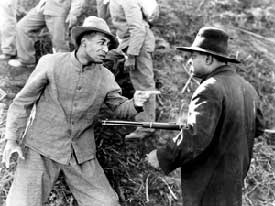 So if not for the "sinful club" sequence & Nina Mae's performance overall, I'm not sure I could've made it through this one. So if not for the "sinful club" sequence & Nina Mae's performance overall, I'm not sure I could've made it through this one.
A further disappointment is that Victoria Spivey, who plays Missy Rose, never gets a chance to sing or to do much at all. She plays "Here Comes the Bride" at a wedding & that's sure nothing special. In her performing life she was a well known blues singer, & is certainly given plenty of reason in this story to sing the blues. But nada.
The main problem here is Vidor's die-hard belief that even the best black man is oversexed to the point that it cannot but destroy his morality, his religious intentions, & make him a violent killer.
Zeke never has even one moment of temptation or anger or disappointment that he is able to transcend or overcome. And the fact that King Vidor even in the wake of much criticism couldn't see & wouldn't believe what he'd really done in concocting these characters is a tragedy in itself.
Truly only Nina Mae comes off splendid in this film, & she makes the film more than worth the time of viewing. She leaves one eager to see all her in everything else she may have done. Alas, her overall career didn't find her nearly enough on the big screen.
Her performance as Chick got her lots of attention & Hollywood producers knew they had someone of enormous star potential in their hands, thus gave her a six-film contract, but then failed to find projects to fulfill that contract for fear that a black superstar would nevertheless lose money because theaters in the southern states wouldn't exhibit them.
So she appears in a couple of short subjects, most famously Pie, Pie Blackbird (1932) included on the remastered dvd release. After fleeing to Europe hoping for better treatment (& she did get better treatment primarily in cabaret bookings), she co-starred with Paul Robeson in Sanders of the River (1935). And she's in a handful of independently produced "race movies" like The Devil's Daughter (1939).
Hollywood, alas, hadn't a clue what to do with her, since she was ready-made for leading-lady roles at a time when black women could only get cast as maids & mammies.
copyright © by Paghat the Ratgirl
|
